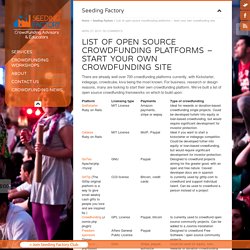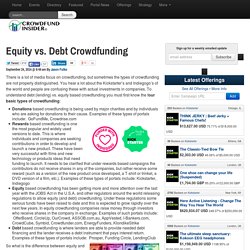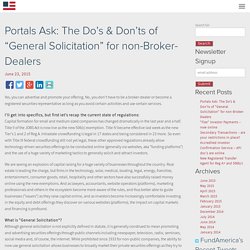

List of open source crowdfunding platforms - start your own crowdfunding site. There are already well over 700 crowdfunding platforms currently, with Kickstarter, indiegogo, crowdcube, kiva being the most known.

For business, research or design reasons, many are looking to start their own crowdfunding platform. We’ve built a list of open source crowdfunding frameworks on which to build upon: Platform Licensing type Payments Type of crowdfunding MIT License Amazon payments, stripe or wepay Ideal for rewards or donation-based crowdfunding single projects. MoIP, Paypal Ideal if you want to start a kickstarter or indiegogo competitor. Paypal Designed to crowdfund projects aiming for the greater good, with an open and free nature. GitTip (The Gittip original platform is a way to give small weekly cash gifts to people you love and are inspired by.) CC0 license Bitcoin, credit cards Is currently used by gittip.com to crowdfund and support individual talent.
GPL License Paypal, bitcoin Is currently used to crowdfund open source community projects. Affero General Public License wepay. Fundlines.com - Search all equity crowdfunding investments at one place globally. Equity vs. Debt Crowdfunding. There is a lot of media focus on crowdfunding, but sometimes the types of crowdfunding are not properly distinguished.

You hear a lot about the Kickstarter’s and Indiegogo’s of the world and people are confusing these with actual investments in companies. To understand debt (lending) vs. equity based crowdfunding you must first know the four basic types of crowdfunding: Donations based crowdfunding is being used by major charities and by individuals who are asking for donations to their cause. Examples of these types of portals include: GoFundMe, Crowdrise.com Rewards based crowdfunding is one the most popular and widely used versions to date.
So what is the difference between equity and debt crowdfunding and why is there confusion? Regulators around the world have had rules to regulate the sale of securities for a long time. As an investor in equity or debt crowdfunding you are investing in a security of the company. Crowdfunding: Law Firm, Attorneys. “Crowdfunding represents the most fundamental change to the U.S. securities laws since the Great Depression and will re-define how companies raise money from investors.”

Mark Roderick, Shareholder at Flaster/Greenberg. Flaster/Greenberg has taken a leadership role in this exciting new field. For in-depth and up-to-the-minute coverage, see our Crowdfunding-only blog by visiting www.crowdfundattny.com or by clicking here. Our attorneys are featured speakers at Crowdfunding events all over the United States, covering topics including: Innovations in Real Estate: Crowdfunded Investing, Harvard Business School Club of New York, New York, NYReal Estate Crowdfunding, NAIOP Development ‘14: The Meeting for Commercial Real Estate, Denver, ColoradoCrowdfund Banking and Lending Summit, CFGE Coastal Shows, San Francisco, CACrowdfund Entrepreneur Summit, CFGE Coastal Shows, New York, NYCrowdfund Real Estate Summit, CFGE Coastal Shows, Austin, TX. Raising Growth Capital Via Regulation A+ -
The way private companies raise money is about to change.

Starting on June 19, 2015, companies will be able to raise up to $50 million a year from both accredited and non-accredited investors under the recently modified SEC Regulation A — what many people are now calling Regulation A+, or ‘IPO-lite.’ These new rules will create an intermediate step between being private and going fully public, and they present an exciting opportunity for those companies that are ready to take advantage of them.
The old Reg A was almost never used. Companies were only allowed to raise up to $5 million, and offerings had to comply with state securities laws in every state where the securities were sold. Consequently, $5 million simply wasn’t enough for most companies to justify jumping through all those hoops. Two Tiers Spurred by the 2012 JOBS Act, the SEC has created a new two-tier fundraising system with the new Reg A+. Testing the Waters Michael Raneri Filing with the SEC. Portals Ask: The Do’s & Don’ts of “General Solicitation” for non-Broker-Dealers - FundAmerica. Yes, you can advertise and promote your offering.

No, you don’t have to be a broker-dealer or become a registered securities representative as long as you avoid certain activities and use certain services. I’ll get into specifics, but first let’s recap the current state of regulations: Capital formation for small and medium sized companies has changed dramatically in the last year and a half. Title II of the JOBS Act is now live as the new 506(c) exemption. Title IV became effective last week as the new Tier’s 1 and 2 of Reg A. Intrastate crowdfunding is legal in 17 states and being considered in 23 more. We are seeing an explosion of capital raising for a huge variety of businesses throughout the country. What is “General Solicitation”? Prior to the JOBS Act and the new rules recently issued by the SEC, investors could not be contacted concerning investing in a private company unless there was a substantive, pre-existing relationship between the issuer and the investor.
Can: a.
Peer To Peer Lending.